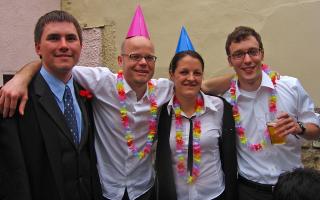My flight to Ottawa is booked. I leave Vancouver at 10:30am on Thursday the 12th of July. I start work the next Monday.
Author: Milan
Photography beyond Bayer
[Photograph removed – 21 October 2012]
The individual pixels in the sensors inside digital cameras cannot collect information from across the entire visible spectrum. To get a full colour image, it is therefore necessary to combine information from several different pixels, each of which has a coloured filter in front of it that acts to establish which part of the visible light range it observes.
Virtually all digital sensors rely upon the Bayer Pattern, invented by Kodak. This allocates half of all pixels to the green portion of the spectrum, with 1/4 devoted to red and blue, respectively. The process of combining the data mathematically is fairly resource intensive. This process is called interpolation. It can be done either using a generic of-the-shelf processor, which is cheaper per unit but not very fast or energy efficient, or with a custom chip, such as the DIGIC chips in Canon digital cameras.
Today, Kodak announced a new pattern for use in CCD and CMOS sensors. The new system uses both filtered and unfiltered pixel elements. These will record brightness data from across the entire spectrum. The new interpolation algorithms then use this panchromatic data to create a luminance channel, to which colour data is added using data from the filtered elements. Doing so may require much more processing power, which suggests that new custom chips will need to be designed.
The benefit of the new pattern is that it will supposedly double the sensitivity of sensors, allowing for better performance in low light. Given how small and inexpensive the lenses on cheap cameras and camera phones are, this is a very important design parameter. Of course, all this constant development in digital photography makes one a bit wary to invest $1000 or more in what is available this year. Chances are, the offer next year will be rather better. For this particular technology, it will probably be necessary to wait until the first quarter of 2008.
Film making around Oxford
All over central Oxford are vans, guards, and heaps of lighting equipment. They are working on the film adaptation of Philip Pullman’s The Golden Compass. As a great appreciator of the book, I am rather nervous about the film. So much of what makes the book special turns around how the characters are presented, and there is the danger that an actor’s interpretation will overwrite whatever conception you had developed on your own. That said, it will probably feature some stunning cinematography from around Oxford. They have been cutting bicycles off fences and railings in places like Radcliffe Square for several days now.
It’s weird how the film adaptation has Daniel Craig as Lord Asriel and Eva Green as Serafina Pekkala. People might find themselves making strange associations with Casino Royale.
Parting party
Our post-exam party went very well. Many thanks to everyone who turned up, and particular thanks to those who brought food and drink. It’s a shame that I will probably not see many of the people at the party for many years, if ever again.
We should all get our thesis and exam results back within the next two weeks.
Botnets
The rise of the botnet is an interesting feature of contemporary computing. Essentially, it is a network of compromised computers belonging to individuals and businesses, now in control of some other individual or group without the knowledge or permission of the former group. These networks are used to spread spam, defraud people, and otherwise exploit the internet system.
A combination of factors have contributed to the present situation. The first is how virtually all computers are now networked. Using a laptop on a plane is a disconcerting experience, because you just expect to be able to check the BBC headlines or access some notes you put online. The second is the relative insecurity of operating systems. Some seem to be more secure than others, namely Linux and Mac OS X, but that may be more because fewer people use them than because they are fundamentally more secure. In a population of 95% sheep, sheep diseases will spread a lot faster than diseases that affect the goats who are the other 5%. The last important factor is the degree to which both individuals and businesses are relatively unconcerned (and not particularly liable) when it comes to what their hijacked computers might be up to.
Botnets potentially affect international peace and security, as well. Witness the recent cyberattacks unleashed against Estonia. While some evidence suggests they were undertaken by the Russian government, it is very hard to know with certainty. The difficulty of defending against such attacks also reveals certain worrisome problems with the present internet architecture.
The FBI is apparently on the case now, though the task will be difficult, given the economics of information security.
Turf celebrations, final Wadham dinner
My last high table dinner in Wadham went well, closely following the general pattern that had become established. Those are one aspect of Oxford I will definitely miss. The opportunity to have a conversation about physics with the person on your left, interspersed with a conversation about Ancient Greek with the person on your right, is a rather valuable one.
Barring a possible brief trip to Europe, I should be in Oxford, relatively unencumbered, for the next two weeks. If there are any things that should be on my list of ‘must see before departure’ places, please let me know.
PS. Wish Claire luck. She is off participating in University Challenge, on behalf of St. Cross.
Good news
During the past eight weeks:
- My thesis was submitted
- I found an excellent job for next year
- I finished my M.Phil exams
As of today, the college has also replaced our broken refrigerator. It will be good to be able to buy food for a period longer than a few days at a time.
I now have 33 days to arrange my departure from Oxford, return to Vancouver, move to Ottawa, and get to work. I might be able to wheedle in one more trip within Europe before I leave Oxford on July 2nd. I am also looking forward to the third incarnation of Tristan’s Cabin Fever event, to take place between July 6th and 8th.
Exams complete
The Developing World exam was not quite as difficult as I feared. While I didn’t refer to the readings as much as the instructors probably wanted, I do think I wrote solid and interesting answers. I wrote on:
- Does ‘dependency’ reduce the ways developing countries can benefit from globalization?
- ‘The moral case for aid is eroded by evidence that rich countries use aid to further their own geostrategic purposes. Discuss
- Have regional institutions helped improve security in developing countries?
And with that, my final exams are complete. By the end of the month, I will have my grades for them, as well as for my thesis. One enduring question is whether I should apply to graduate in absentia. That is the only way I am likely to graduate in the next year or so, but it would mean I could never attend a graduation ceremony. A complicating factor is that I will not technically have an M.Phil until I have formally received the degree.
In any case, I am going to try to get a bit healthier before tonight’s celebration once the last members of the program finish their exams. I also have my last high table dinner in Wadham tonight, as the term and my Senior Scholarship come to an end together.
Predictable law exam complete
The international law has been written, and nobody who took the course can possibly complain about its content. Indeed, it was astonishingly predictable. They snuck on fourteen different possible topics, and I am pretty sure every one of them was either on a previous exam or taken directly from our reading list. As such, the main problem in each answer was effectively summarizing everything you knew about it, rather than wracking your brain in search of anything to write. I wrote on:
- Why have international legal efforts to regulate the global atmospheric environment had such mixed success?
- Is it proper for the World Trade Organization to be concerned with the elimination of economic inequalities within or between states?
- What are the considerations that lead states to comply with provisions on international law?
I only heard after the exam that the assessors might be less than pleased about me answering a question so closely related to my thesis. If so, there is nothing that can be done for it now. Overlap is also a bit of a concern between the second question I answered on this exam and the second question I answered on yesterday’s theory exam. Clearly, I cannot write about either inequality or the WTO during tomorrow’s developing world exam. As such, it is probably go time to brush up on the security issues that exist in the developing world. Just nineteen hours or so away from being finished, now.
Slam poetry
I am in the midst of exams, so instead of writing something entertaining myself, I will just link you to the website of Eric Darby: a slam poet. He has three samples available in mp3 format:
You can read more about the genre on Wikipedia.
Lots more slam poetry is on YouTube. The most interesting such poetry I have heard was at Bar 13 in Manhattan. That said, the Café Deux Soleils in Vancouver has some good poetry nights. If you get the chance to see Shane Koyczan, make sure to take it.



